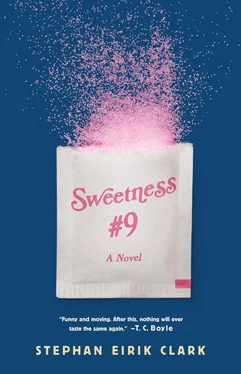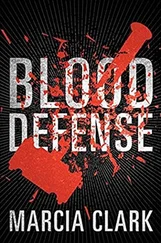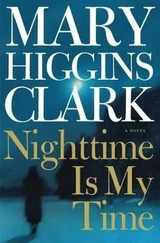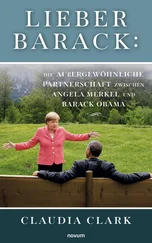“What’s that, Bonnie?”
“Plant a victory garden. Take back control of your food.”
“Get a little dirt under your fingernails, America. It won’t hurt you, but not doing it will.”
After picking up Peter at the curb, I flipped over to a station that looked at the day’s events through an economic lens. Here, a man whose smooth voice brought to mind cuff links and silk ties told us that stock prices had fallen for all the major supermarket chains, while commodities such as wheat, sugar, and corn had also taken a hit. He sighed dramatically, as if he’d lost tens of thousands of dollars since breakfast. “I hate to say this,” he said. “but I don’t think it’s going to get any better. I think these prices are only going to continue to fall. This is supposed to be the busiest week of the year in America’s supermarkets, but when people go home tonight, I think they’ll be looking into their fridges and freezers and wondering if they can make do without a trip to the store.”
Betty was doing just that when I got back from the airport with her brother. As the garage door lifted and I drove the Volvo inside, my headlights caught her in front of the stand-alone freezer, holding the lid open. From the way she was staring down into it, you would have thought she was at a funeral, standing over an open casket.
“I can’t believe this was full just two days ago,” she said as we stepped out of the car.
On the drive down, I had told Peter about our purge of Sweetness #9 and Red Dye No. 40.
“I hope you like your steak with a little freezer burn,” I said, as Betty hugged her brother. “I’m not sure we have much else.”
“We’ll be fine,” Peter said. Like many alcoholics on the mend, he looked for happiness in the mere absence of all the many private horrors he had once known. “It’ll give us an opportunity to realize how grateful we should be. In many parts of the world, kids live on a spoonful of rice cooked in dirty water each day.”
“Well, it’s not as bad as that around here just yet,” Betty said.
“In fact,” I told him, carrying his bag indoors, “I think we still have a jar of wasabi mayonnaise in the fridge.”
After Betty had made a bed for Peter on the sofa in the great room, she closed the door behind her in our bedroom and went into the dresser for a Ziploc bag.
“It was on the kitchen table when I came in,” she said. “There with the rest of the day’s mail.”
The Ziploc bag held a plain white envelope, still sealed, with a packet of Sweetness #9 inside. This much was obvious when I pinched the shadowy center and felt the granular texture.
“It’s not the one from work?” I asked.
I had reached for the remote earlier and turned on the television. Betty had me hold the envelope up to the light of the screen. Its contents weren’t pink; that much was certain. The light shined through the packet, clear and true.
I handed the envelope back to her, and as I did, I saw the banner on the bottom of the TV screen: AMERICA’S SUPERMARKETS UNDER ATTACK.
“I think we should get a security system installed outside,” I said.
Early the next morning, a high school baseball coach lost two fingers while reaching for a box of energy bars at a Foodtown supermarket in Toms River.
Fear spread quickly, as if from word of an Indian attack.
After the news went out on the television, college students and inner-city kids, as well as drug addicts and the hopelessly unemployed, began gathering outside supermarkets throughout the region. Mostly young to middle-aged, and almost entirely male, these people promised to take your shopping list into the store and bring your groceries out to your car for a price. Such entrepreneurs, trading on their risk and daring, charged wildly different fees, based on the number of goods you required and their or your level of desperation. Some profited from their suburban good looks, a commodity many shoppers were quick to seek out after the news stations gave a lot of play to one story of a woman who said she’d given a young black man $150 and a shopping list, never to see either again.
What could you do? There was nowhere else to turn. There had been a run on the nine-dollar-per-gallon milk sold at every 7-Eleven and gas station mini-mart between Maryland and Boston, and though there were reports of some people driving as far away as West Virginia or Ohio to do their Thanksgiving shopping, there were just as many stories about price gouging and people left without a choice because they didn’t own a car. Fearing they might lose business to the restaurant trade, several enterprising supermarkets announced new delivery services that would ensure people could continue the “essential tradition” of a home-cooked Thanksgiving meal without fear. But when someone shot out the front tire of one of these delivery vans, causing it to spin out of control and its driver to suffer massive injuries, courtesy clerks were no longer so eager to leave the store and get behind the wheel.
I had a call scheduled with a salesman in the field late that morning, but we barely spoke of his new contacts or our hopes of extending our reach in the Pacific Northwest. He had the television playing in the background of his Boise hotel room as he spoke of expecting something bigger and bolder, something still more spectacular to come. He lived out west, far from the danger; he could allow his mind to imagine a hundred bodies piled up in the aisles of an Acme, the shoppers victims of a poison gas attack and sealed doors; he could tell me of the thousands who could be poisoned by eating apples or pears injected with potassium cyanide or strychnine at a single compromised distribution center in California’s Central Valley.
“It’s a wonder it hasn’t happened before,” he said. “It’s a wonder anyone goes to the store at all.”
After an explosion in Jupiter Park killed a man early that afternoon (remarkably, the first fatality since this spree began), I turned in to the break room and found Beekley standing before a large map of the United States that he’d pinned to the wall.
“Can you feel it?” he said. “I can feel it in the roots of my teeth.”
As he turned to me, I saw he’d been to the barber. His fade and the words carved into it were gone, replaced by a more severe and uniform hairstyle, one that gave him a militant look, the haircut of a sharpshooter or a sniper. That wasn’t all: he was wearing a black arm-band over his lab coat, one that flashed out before me as he stepped closer to the map and crossed his arms against his chest.
“Violence is like a virus, and I think right now we’re seeing it jump carriers from the schools to the supermarkets.”
He’d pushed pins, each with a bulbous red head, through those cities on the map that had already been targeted: Doylestown, Levittown, and Ewing Township to the west and southwest, Toms River and Jupiter Park out on the coast, and then Paterson and Poughkeepsie to the north. It was only once my eyes had strayed across the state line into New York that I noticed the other pin way out west.
“Moses Lake, Washington?” The cable channels hadn’t said anything about it.
“A shooting in July,” Beekley said. “Two nuns were gunned down in an Albertson’s. The diet soda aisle, just like Poughkeepsie.”
“How’d you hear about that?”
“I’m a professional, David. It’s my job to know.”
As he took out a black Sharpie and started drawing lines between the affected cities, my eyes strayed to our old Zenith, where the news was showing the senior yearbook portrait (late seventies, ruffled shirt and baby blue tux) of the Hispanic man who’d been fatally injured in Jupiter Park. He was a thirty-eight-year-old bachelor who’d recently been laid off from his job at the mall selling funny T-shirts; homeless off and on for much of his life, this one-time navy cook had found himself working as a “mercenary shopper” at the Pathmark on Jupiter Park’s east side. His luck ended on his fifth or sixth trip of the day, when he went into the grocery store on behalf of a diabetic and reached for a sugar-free frozen dessert. He pulled it out close to his belly, the chief of police said at a news conference. “His spleen ruptured, and he died in emergency surgery.” The chief then ceded the podium to the diabetic man who’d hired the victim, an elderly fellow who wore red suspenders and stood with the help of a walker. He wept openly, urging the public not to employ professional shoppers. “I’ll never forgive myself,” he said. “I’ll never be able to look at food in the same way again.”
Читать дальше












